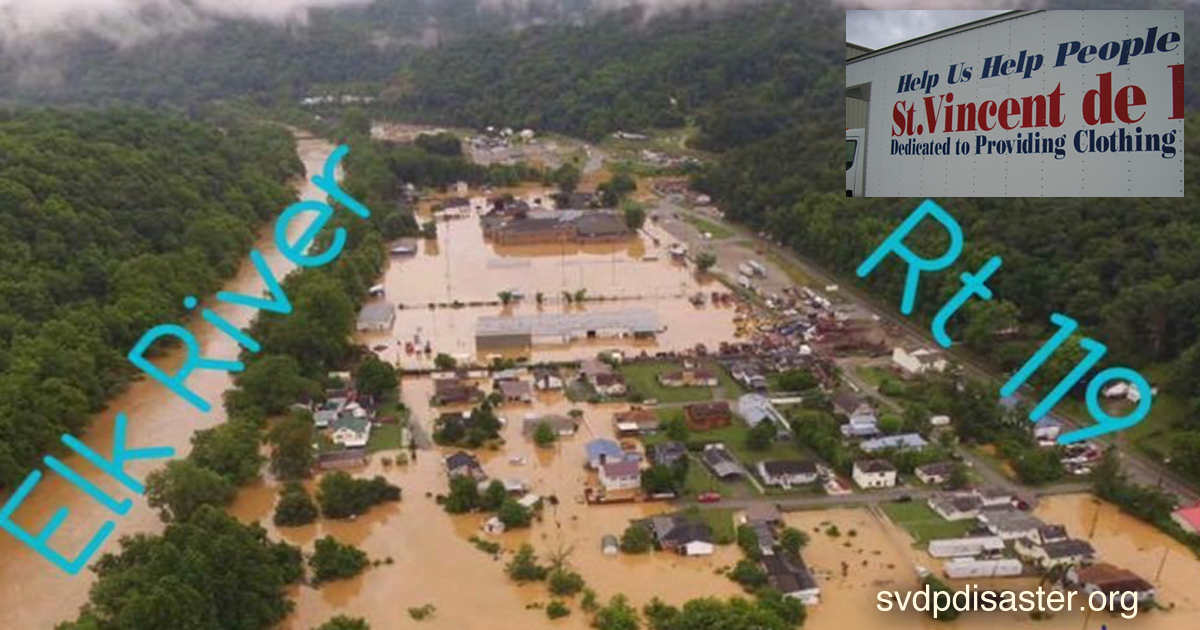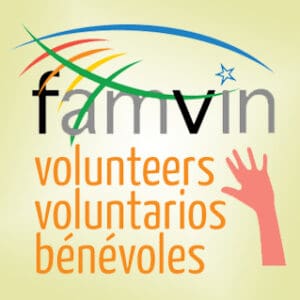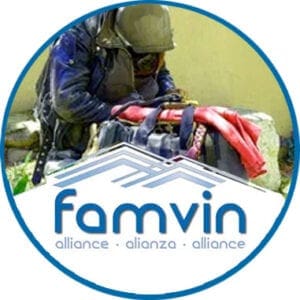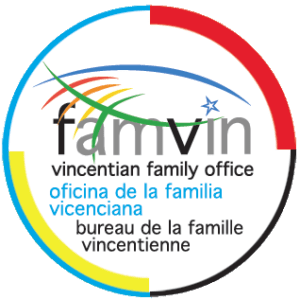Last Responders: Vincentian Disaster Relief
Extreme weather conditions are all over the news this summer, most recently the flooding in Louisiana. West Virginia is still trying to recover from extensive flooding that killed 23 people and damaged/destroyed over 1200 homes in June.

Members of the Vincentian Family, specifically members of the St. Vincent de Paul Society are often called “last responders.” After the news cameras go away and the hard reality of the disaster sets in, they are the ones that remain with the families providing prayer support, food, water, furniture, money for utilities, and other help for those who have been temporarily out of work. They have the reputation of doing whatever is necessary from being around for the long haul to doing the “belly work.”
Bob Hart, the Disaster Coordinator for the St. Vincent de Paul Society in West Virginia writes:
I am participating in the St. Vincent de Paul Society Walk for the poor here in WV. Of course all of the flooding in the southern part of the state has drawn lots of attention, especially if you are a golfer and wanted to watch the Greenbrier Classic. I am a Disaster coordinator for the Society in WV AND have been following events and know of the wonderful works our volunteers are doing there.
This kind of event flashes on the news and then goes away. However, the long lasting effect of losing home and job are hard to overcome for years. Our Society is with these people, holding their hand, praying with them and will be there for the long term. While that is going on, there are others in the state who have lost jobs due to coal mines closing. We have been serving these people here in WV since 1865.
St. Vincent de Paul described its special fund for disaster services in a January edition of the St. Vincent de Paul Frederic’s E-Gazette article:
We do not provide for immediate “first responder” services from our Domestic Disaster Fund; however a Council can decide to do so on its own through existing resources. The Fund provides monies to help Councils and Conferences provide long-term housing, furniture and other assistance not covered by FEMA, American Red Cross and other short-term resources. Additionally, where available, the National Council’s Disaster Services Division will compete for grants to provide long-term casework and related services on a reimbursable basis. These grants will only be considered in close cooperation with local Council leadership.
Flooding may last only a day or two in a community but the impact can last for months, especially for poor families already in a flood-prone housing community. Resources from the government and first-responders may help but for only a few weeks, while displacement can be for weeks or months and compounded by the loss of so many possessions and sometimes even employment. Our Society of St. Vincent de Paul is often the community’s only resort for such assistance.
Ever heard of a House in a Box?
Another program, called House in a Box, is something that St. Vincent de Paul started in response to Hurricane Katrina. When a local family is finished with repair and mold remediation or settled into semi-permanent housing, House in a Box volunteers step in to help them create a home.
Through corporate partnerships with companies like IKEA and Sears, House in Box can purchase items for a typical family of four for $1,850 instead of the actual cost of $6,000. Each family receives beds, a dining room table, dishes, linens and towels, pots and pans, a dresser and living room furniture — items likely ruined by flood waters. (Read more about House in a Box and its personal impact by clicking here).
The Sisters of Charity of Nazareth Volunteers are also helping out in West Virginia doing “Belly Work”
SCN volunteers are working in Clendenin, West Virginia, (outside of Charleston) where the whole town was under water. They are assisting with mud outs in the crawl space under flooded homes. They call it “belly work” because you crawl in to remove soaked insulation, molded wood and contaminated duct work.
Click here to view photos of their volunteers in action.
What can you do to help?
Bob Hart says: most importantly, keep us in your prayers, that doesn’t require a credit card.
Sign-up for a National Friends of the Poor Walk in your area!
Read these resources about how St. Vincent de Paul Assists in disaster relief:
For more information about the National Council of the St. Vincent de Paul Disaster Services Division, click here.
Click here to see a review of the Disaster Services Division operations in 2015.
Click here to see SVDP’s House in a Box program in action.







0 Comments